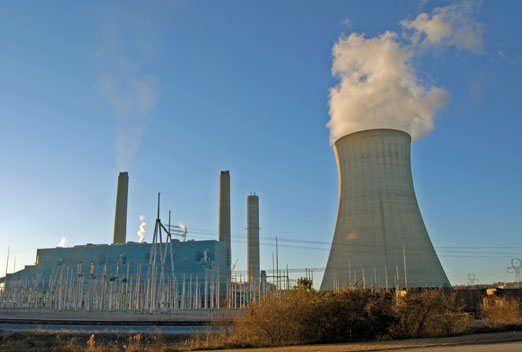
Alabama Power’s Miller Steam Plant on the Locust Fork of the Black Warrior River emits more mercury into the air than any other coal-fired power plant in the country. It is also a source of fine particulate pollution and ozone: Glynn Wilson
By Glynn Wilson –
The United States Supreme Court upheld the authority of the Environmental Protection Agency to regulate the air pollution from coal-fired power plants on Tuesday in a ruling that is being hailed as a major victory for the environment but a political setback for the Obama administration.
The 6-to-2 ruling upholds the centerpiece of President Obama’s so called environmental agenda, a series of new regulations aimed at cutting pollution from coal-fired power plants, according to some sources, although others say it is a defeat for the Obama administration which sought to delay implementation of the new rules for political purposes.
EPA administrator Gina McCarthy called the decision “a resounding victory for public health and a key component of EPA’s efforts to make sure all Americans have clean air to breathe.” She said in a statement that “the court’s finding also underscores the importance of basing the agency’s efforts on strong legal foundations and sound science.”
The interstate air pollution regulation, also known as the “good neighbor” rule, has pitted Rust Belt and Appalachian states like Ohio, Michigan and Kentucky against East Coast states like New York and Connecticut. The regulation was aimed at air pollution that drifts across state lines from 28 Midwestern and Appalachian states to the East Coast.
Legal experts indicate that the decision, written by Justice Ruth Bader Ginsburg, signals that the Obama administration’s efforts to use the Clean Air Act to fight climate change due to global warming from the burning of fossil fuels for energy could withstand further legal challenges from Republicans and the coal and power industries, which have criticized the regulations as a “war on coal.”
The plaintiffs in this case, which include the Sierra Club, the American Lung Association, the National Resources Defense Council and the Environmental Defense Fund, asked the U.S. District Court for the Northern District of California to order EPA to make a decision on new national smog standards by October 2015 and to issue a proposal by December of this year.
The EPA asked the court for more time, but the California judge ordered EPA to follow the schedule requested and the Supreme Court upheld his ruling.
“This is an enormous victory for clean air, even though it is a defeat for President Obama,” Frank O’Donnel of Clean Air Watch said in a statement issued by e-mail shortly after the ruling came down. “This means that the Obama administration can’t pass the buck on the smog issue.”
The standards already in place were “too weak to protect Americans from death and disease,” he said. “The only real question now is how much tougher might the standards get.”
The Sierra Club issued a statement saying the decision “will protect Americans from dangerous cross-state air pollution from coal-fired power plants. The court gave a complete and resounding victory to EPA, putting back in place a protection that will reduce soot and smog pollution from power plants in 28 states, improve air quality, and reduce life-threatening respiratory illnesses that affect millions of Americans.”
“Today’s ruling is a resounding victory for public health, especially for people living downwind from coal-fired power plants in other states,” said Sierra Club Executive Director Michael Brune. “For too long, these communities have shouldered an unfair burden on their health and wellbeing without the ability to protect themselves and their families from dangerous pollution. The court’s ruling affirms the authority of the EPA, under the Clean Air Act, to issue standards to protect public health from life-threatening air pollution that travels across state boundaries. “
The EPA is expected to propose a new Clean Air Act regulation in June to cut emissions of carbon dioxide, the heat-trapping greenhouse gas that scientists say is the chief cause of global warming. There is widespread agreement in the scientific community that coal-fired power plants are the largest and worst source of carbon emissions in the U.S.
The agency had been preparing to issue these new regulations back in 2011, but President Obama told the agency to delay it after his advisers warned that it could hurt his re-election chances in coal-reliant swing states like Ohio. He has also shown concern that the Republicans might use this so-called “war on coal” issue to regain control of the U.S. Senate in this year’s mid-term elections, but the court’s majority ruling should provide some political cover.
In its arguments before the court, the EPA said the rules were necessary to protect the health and the environment of downwind states. East Coast states in particular are vulnerable to pollution blown by the prevailing west-to-east winds. The soot and smog produced by coal plants are linked to asthma, lung disease and premature death.
Once implemented, the Cross-State Air Pollution rule will “improve the lives of millions of Americans, and many of these improvements will be felt almost immediately,” the Sierra Club said. “Protecting the public from cross-state air pollution will prevent tens of thousands of premature deaths annually, help American families avoid 19,000 emergency room visits, and prevent 1.8 million missed work and school days each year. The rule would also save Americans up to $280 billion in annual health and environmental costs.”
In her decision, Justice Ginsburg noted that in reining in interstate pollution, regulators must account for the vagaries of the wind. “Some pollutants stay within upwind states’ borders, the wind carries others to downwind states, and some subset of that group drifts to states without air quality problems,” she wrote, adding a biblical quotation from the Book of John: “The wind bloweth where it listeth, and thou hearest the sound thereof, but canst not tell whence it cometh, and whither it goeth.”
In a dissent, Justice Antonin Scalia, joined by Justice Clarence Thomas, said the regulation was unwieldy and suggested it was “Marxist.” Justice Samuel A. Alito Jr. recused himself from the case.
The utilities and 15 states opposed to the regulations argued that the rules, as written by the Obama administration, gave the EPA too much authority and placed an unfair economic burden on the polluting states.
The decision will force coal plant owners to install costly “scrubber” technology to curb smokestack pollution of smog-forming chemicals. Many owners have said the regulation would be so expensive to carry out that they expected to shut down their oldest and dirtiest coal plants.
While coal mining unions have also objected to the rules, fearing the loss of jobs if coal-fired power plants close down, pipe fitters unions will benefit from the jobs that will be created if power companies such as those owned by Southern Company are forced to install more pollution control equipment to keep existing power plants open.
Republicans in Congress denounced the decision, but it was hailed as positive by governors from East Coast states that have been subject to tougher air pollution requirements than other parts of the country for more than 15 years. The East Coast governors have long criticized the Appalachian and Rust Belt states for their more lenient rules on pollution from coal plants, factories and tailpipes — allowing those state economies to profit from cheap energy while their smog and soot have been carried eastward by prevailing winds.
In a related ruling, the U.S. Court of Appeals for the District of Columbia also recently upheld another major EPA Clean Air Act rule that would cut mercury pollution from coal-fired power plants.
You can read the decision here.













